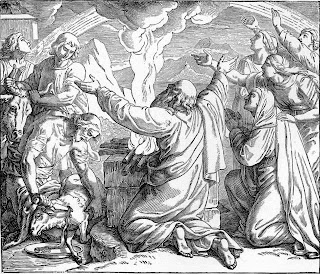Season: Creation
Scripture: Genesis 8:20-22 and Psalm 104:1-9, 24-35
Sermon: Sustain Me!
OK ... imagine this scene.
The Flood is finally receded. For the first time in almost a year Noah, his family and all the creatures they saved from the waters are once again on not-yet-dry land.
They are exhausted by the ordeal. Elated it is finally over. Humbled and more than a little insecure at the inescapable realization of God's ability to destroy all, limited only by God's inexplicable desire not to destroy it altogether.
Noah, gripped by religious impulse, grabs some of the clean creatures that have survived and kills them with his own hands. He burns them on an altar. And as the smoke and smell of their burning flesh rises to the heavens, Noah falls to his knees in the mud and offers a prayer to God.
And the prayer he prays is ... Psalm 104. (Why not? I'm writing the play here, and it seems perfect.)
What a deep triangulated covenant of God, Earth and humanity is created, celebrated and cemented in that moment! God somewhere in the heavens -- creating, judging, yet also sustaining all that is. Earth in its muddy reality -- radiating for all time God's glory, but dependent in every moment on God's good will for its life. Humanity, God's conscious and self-conscious agents on Earth -- helping determine Earth's future, but always in the end on its knees sacrificially offering it back to God as God's own.
Does the scene seem pagan ... or holy? Does the covenant and what it requires seem primitive ... or universally true and faithful?
The British author Julian Barnes in his book, The History of the World in 9 1/2 Chapters, delightfully portrays the faithful, religious Noah as somewhat of a dangerous eccentric and insecure tyrant over the animals on board the ark. The fact that at the end he grabs and kills some of the best of them as a sacrifice to his God, mere moments after they have marked their survival of the ordeal of the Great Flood, only reinforces how irrational and arbitrary he and his notion of God must be.
Or is it maybe that the more we hang on to Earth and its creatures and make all we see, our own ... make the story just about Earth and us -- about what Earth means to us and what we can make of, and do with Earth ... squeeze God out of the picture ... stop kneeling in the mud and sacrificially giving it back to God ... put an end to the messy triangle, and more simply marry Earth just to our designs ...
... that we become the dangerously eccentric and irrational tyrants?
I'd love to wrote a play or short story about this. It could be delightful.
I have to write a sermon, though. It has to be helpful and honest to who and where and how we are.
What do you think the message is for us?

No comments:
Post a Comment